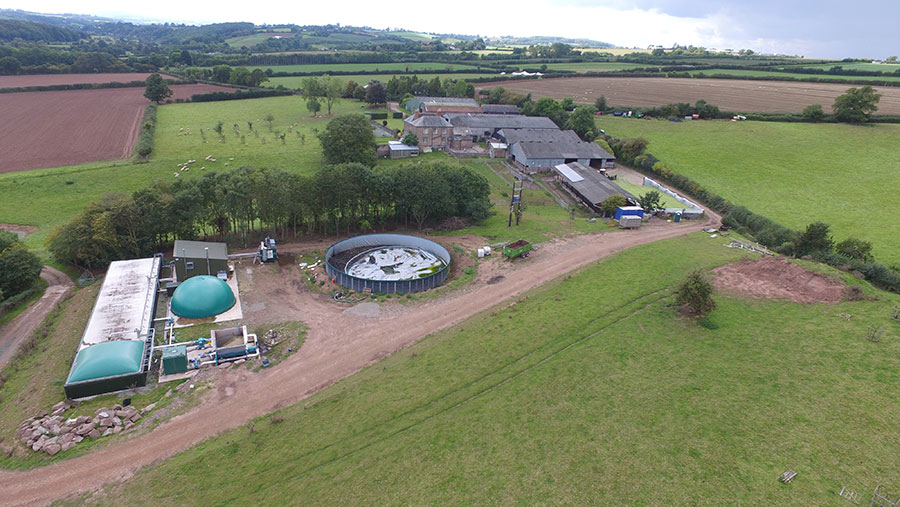AD plant diversification benefits soils on mixed family farm
 Henry and Esther Rudge with their son, Monty (right) © Richard Stanton
Henry and Esther Rudge with their son, Monty (right) © Richard Stanton When Esther and Henry Rudge sought to future-proof their mixed farming business, they embarked on the development of a sustainable anaerobic digestion plant to diversify their income stream, benefit their soils, and cut artificial fertiliser and energy costs.
Four years on, the closed-loop system has significantly benefited the winners of the Farmers Weekly Awards 2020 Environmental Champion of the Year’s farm.
Soil health has particularly improved due to applications of digestate, which has saved a huge £10,000/year in fertiliser costs on their Herefordshire farm, in the heart of the Wye Valley.
See also: How maize is helping grower cut costs and build soil health
Digestate benefits
The application of 1,200t of nutrient-rich digestate provides a wholesome supply of nitrogen, phosphorus, potassium, calcium and sulphur, which is spread in between cuts of grass silage and after the wheat harvest.
Maize crops no longer receive any artificial fertiliser, soil indexes for phosphorus and potassium have risen to 3 and 4, and the spreading of 2t of lime every three years is no longer required. Crop yields have also increased.
“The plant works well, as it links our farming practices together. Soil structure and health has consistently improved – we need to care for our soils and let them work for us,” says Esther.
AD plant type
Originally, the family applied for a 120kW AD plant but, due to limited capacity on local power lines, this was not possible. Instead, the Rudges opted for a smaller 83kW plug flow digester, where the contents naturally flow through the system, using gas mixing, with a retention of at least 40 days.
The smaller plant works extremely well, offering a more manageable workload. Having too big a plant with not enough land would otherwise force the family to buy more feedstuff and risk overloading their soils with too much digestate.
“Finding the right plant that works for your farm is important. Nearly all our inputs are home-grown crops and we have enough suitable land to optimise our digestate waste management,” says Monty.
Operating the plant
The 80kW anaerobic digester operates at 93% efficiency and is managed by the Rudges’ son, Monty.
It produces a total of 672,000kW of energy a year, where 556,000kW is annually exported to the grid. Energy is also used on farm to supply heat and electricity to the farmhouse and glamping facilities.
Nearly all crop inputs are grown on farm, with the exception of 300t of sugar beet, which helps feed the plant over a five-month autumn/winter period.

The Ballingham Court AD plant © Esther Rudge
At present, the plant receives 4t maize silage, 2t sugar beet, 1t chicken muck from a local farm and some farmyard manure every day. During the summer months, 2t wholecrop/day is used to pad out the maize.
The intention was to use the farmyard manure as a major input, but the family found the fibrous straw blocked augers and caused pumping difficulties.
A macerator was bought last year to improve workability of large inputs and increase their surface area. After all, more degradable material means more biogas production. This has proved particularly useful for sugar beet and wholecrop.
Mighty maize
Maize makes up the main feedstuff for the AD plant, where 1,100t is used each year from 35ha grown on farm.
“The crop is brilliant for biogas production,” says Monty. “To achieve the same output from cattle muck, you would need three times the amount.”
However, he admits that relying so heavily on one crop is risky, as a bad harvest could be problematic.
As maize supplies begin to run low in August, the family now grow 8ha of triticale, with the intention of reducing the reliance on maize by 1-2t/day.
Monty highlights the importance of not making sudden changes to the plant’s inputs, otherwise bacteria populations that break down organic matter can be disturbed.
“The last time we switched to triticale it upset the plant, so we need to ensure consistency and a gradual introduction of new inputs.”
Enter Farmers Weekly Awards 2021
 The 2021 Farmers Weekly Environmental Champion of the Year Award is sponsored by Woodland Trust/a>.
The 2021 Farmers Weekly Environmental Champion of the Year Award is sponsored by Woodland Trust/a>.
Join Farmers Weekly in celebrating the farming industry and recognising the hard work of UK farmers and enter the Awards today.
Alternatively, nominate a deserving individual for an award.
For more information about the 2021 Farmers Weekly Awards, visit the official website.

